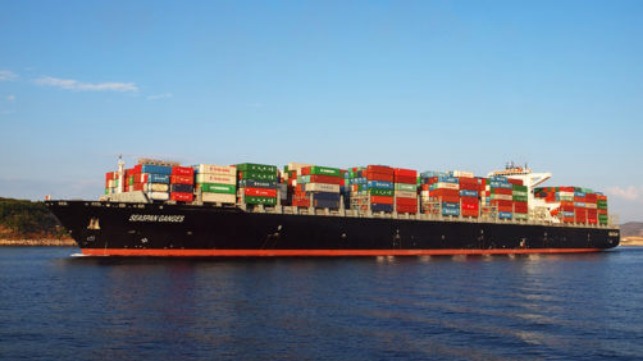Hapag and Seaspan Scheduled Five Methanol Conversions for 2026

Hapag-Lloyd working with vessel owner Seaspan detailed plans for the first five methanol conversions for their containerships. The companies report the total investment is estimated at around $120 million for the five vessels which will be retrofitted in 2026 as part of a larger program announced last year.
The retrofits are scheduled to begin in the first quarter of 2026 and are expected to take between 80 and 90 days per vessel. The ships selected for the project were all built in China in 2014 and each is 1,105 feet (337 meters) in length and 115,000 dwt with a capacity of 10,100 TEU. They are operating under a long-term charter from Seaspan to Hapag. The ships are the Seaspan Amazon, Seaspan Ganges, Seaspan Thames, Seaspan Yangtze, and Seaspan Zambezi.
According to the companies, the project calls for converting the conventional MAN S90 engines to dual-fuel engines capable of operating on methanol. MAN has previously said that it is a straightforward process as its standard, electronically-controlled diesel engines are being constructed as dual-fuel ready making them ready for retrofitting.
MAN working with Seaspan and Hapag announced in July 2023 a project that initially calls for the retrofitting of 15 vessels in the Seaspan fleet operating under long-term charters to Hapag. The agreement includes a further 45 optional engine retrofits.
Hapag highlights the project is part of its overall environmental strategy. Each conversion can provide a CO2 reduction of 50,000–70,000 tons each year according to MAN, when the engines are operating on green methanol. The German liner operator highlights in its new 2030 strategy that it is committed to reducing greenhouse gas emissions by around one-third by 2030 and achieving net-zero fleet operations by 2045.
The first planned conversion of existing containerships to methanol-fueled operations is slated to begin in July as Maersk proceeds with a retrofit project with China’s Xinya Shipyard. Steel cutting began in March 2024 and the Maersk Halifax is scheduled to arrive at the yard in early July. The shipyard reports the conversion and repairs on the vessel will last about three months.
Last year, Maersk reported it would be the first of a series of conversions. The contract anticipates that all 11 ships in the class will be converted with Maersk reporting it would be timed to special surveys of the vessels. MAN PrimeServ will provide a package comprised of engineering, parts, project management, onsite technical assistance, sea trial assistance, and recertification work during the projects.
The industry will be closely following the progress on these refits as green methanol is anticipated to be one of the future fuels for shipping. Hapag pioneered the first conversion of a large containership to LNG operation in 2021. While the company cited the high cost of the project even on a vessel that was designed for the conversion, other shipping companies including Matson and TOTE have followed also undertaking the conversion of conventional ships to LNG.
Maersk ushered in the era of large dual-fuel containerships operating on methanol in 2024 with the introduction of its first two vessels now completed. They began the operations with the first methanol-fueled containership in 2023 as a feeder in the Baltic region which is also helping the company to learn about methanol operations.
DNV reports that there are currently 165 containerships on order to operate on methanol. Over the next five years, they report the methanol fleet will grow to nearly 270 vessels up from less than 10 a decade earlier.
